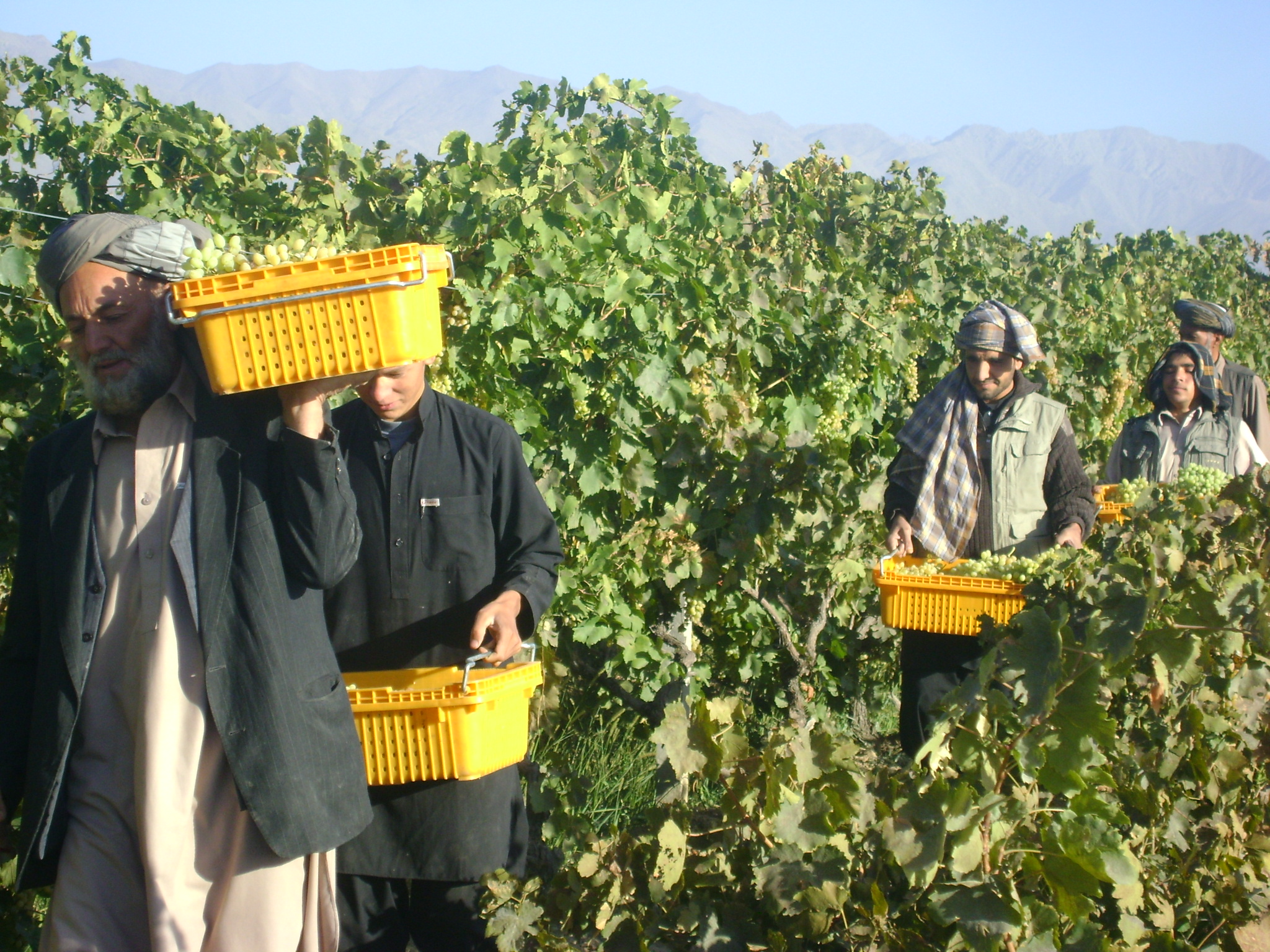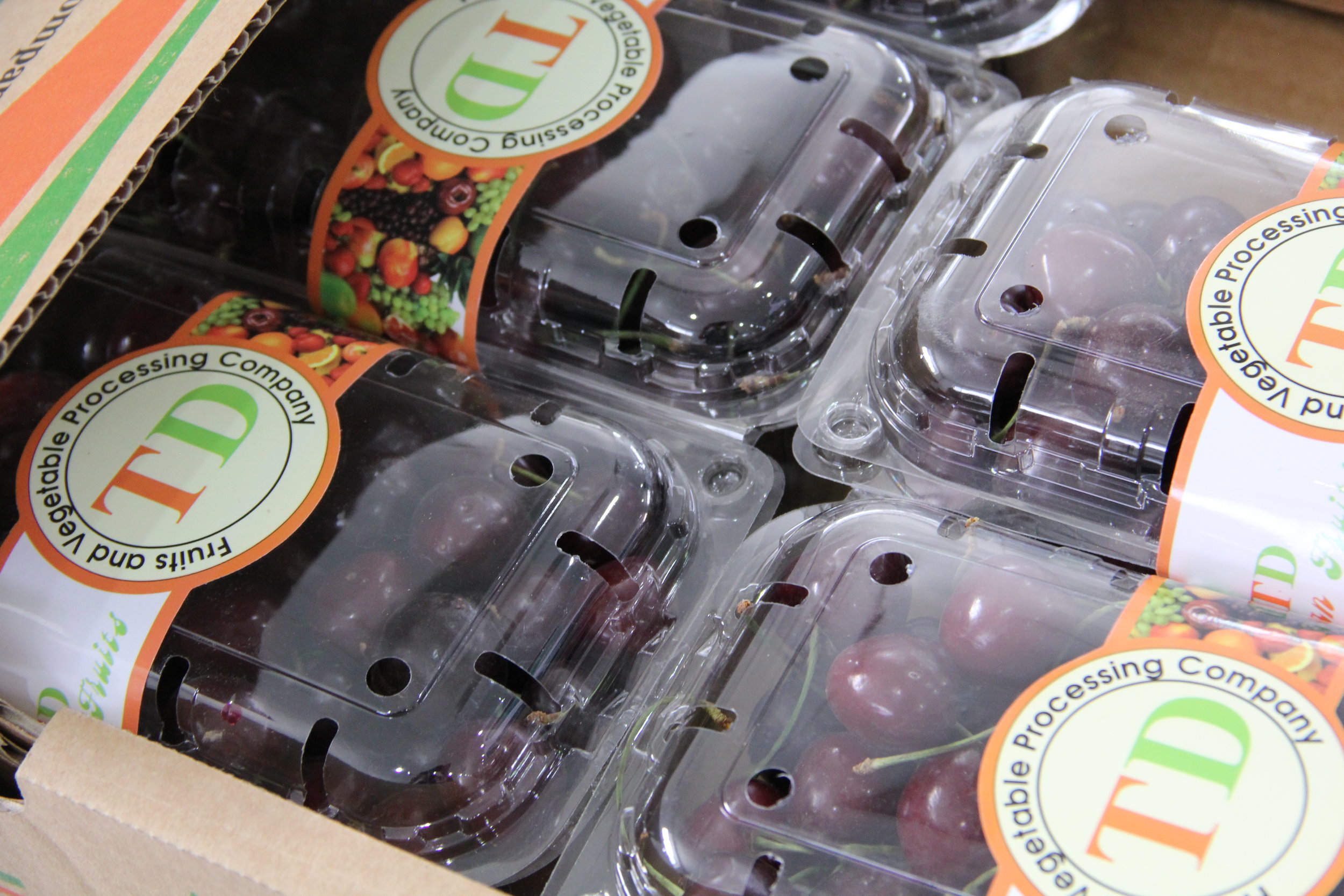AFGHANISTAN
Since the regime change, Roots of Peace continues to work in remote provinces of Afghanistan to harvest fresh fruits and vegetables to be sold in markets benefiting the farmer in the field.
Afghanistan is our flagship country. Since we began work in the country in 2003, we have worked with over two dozen agricultural value chains throughout every province in the country, planting 6 million trees, creating over 20,000 full-time jobs and facilitating exports worth over $491 million.
OUR PROGRAMS
Explore our three programs in Afghanistan; CHAMP (completed), AMP (current) and CBARD-AIM (current).
PROJECT HIGHLIGHTS
Our impact is a catalyst in supporting the maximization of farmer incomes and promoting peace at the community level.
Introduction of Grape Trellising
Issue: Grapes in Afghanistan have historically been grown bush style which has had adverse affects on quality and yield.
Solution: To address this we introduced trellising. Farmers were slow to adapt so we led a successful pilot program which quickly turned them into believers. Wood is very expensive in Afghanistan so we designed trellis posts made with concrete and rebar and setup 3 competing businesses for production. Region by region we expanded.
Impact: Now we have supported over 6,000 farmers as they converted to trellised vineyards which has increased their income by up to 400%.
Development of first nursery system
Issue: High quality seedlings of the right varietal are key to maximizing farmer income. In Afghanistan these were few and far between for the majority of crops.
Solution: To address this we developed Afghanistan's first nursery system to provide high quality seedlings of varieties that were in high market demand.
Impact: This has resulted in millions of trees being planted that directly meet market demands.
Introduction of Potato & Apple Storage Cellars
Issue: Potato & apple prices have a cyclical rise and fall in Afghanistan that is directly correlated to the influx of production during harvest time.
Solution: To take advantage of the higher offseason pricing we introduced storage cellars which extended the shelf life well beyond that of those of traditional storage units.
Impact: Underground cool rooms enable farmers to store their apples for two to four months and then introduce them into Afghan markets at twice the harvest season price. This led to average increases in income of approximately 50%.
New Raisin Drying Facilities
Issue: Traditional Afghan raisin drying facilities (kishmish khanas) produced raisins that were dusty, unevenly dried and discolored.
Solution: To remedy this, we designed new raisin drying facilities incorporating the best of their design along with some key adjustments.
Impact: This led to average increases in income of approximately 50%. The drying facility now rewards farmers with a selling price that is a third higher than traditional sun-dried raisins.
Introduction of New Grape Varieties
Issue: After identifying the best local varieties for export and developing those value chains our team identified additional market demands of which Afghan farmers can take advantage.
Solution: These were red globe grapes and seedless black grapes. We imported these grape cuttings, setup pilot farms and quickly expanded.
Impact: These grapes are now in high demand in the Indian and Dubai markets with significant opportunity for growth.
Introduction of New Cherry Varieties
Issue: Local cherry varieties generated no interest in export markets while the local market offered very low prices.
Solution: We imported 5 varieties of "Bing" style cherries from Italy and USA. Each of these matured at different times to provide a longer harvest period. These new cherries, with better flavor and size, rapidly replaced "local" varieties.
Impact: We planted 500 pilot orchards and established nurseries to propagate more which has led for the industry to rapidly expand.
Introduction of New Apricot Varieties
Issue: Apricots were an established product in Afghanistan in high demand in export markets yet they could only grow in certain parts of the country due to climate conditions.
Solution: ROP imported five new apricot varieties to grow in challenging areas for the soft fruit. These complemented some excellent apricot varieties already growing in Afghanistan, but expanded the range for plantings.
Impact: Apricot production has continued to expand in Afghanistan helping improve the incomes of many farmers while generating additional production that helps in export marketing.
First Export Cold Chain
Issue: Lack of cold storage in Afghanistan has traditionally limited the shelf life of fresh fruit and the markets where they can be sold.
Solution: We set up cold storage chambers, pack houses and reefers that allowed Afghan traders to bring fresh fruit to markets that pay premium prices and help absorb increased production. We've provided more than $1.5 million in grants that brought state-of-the-art technology in sorting, cleaning and packaging.
Impact: This has resulted in Afghan fruit reaching countless new markets from Europe to the Middle East to North America for over a dozen products. As a result, Afghan traders have exported 244,762 metric tons valued at $491 million.
Introduction of Pest Resistant Rootstock to Rescue Citrus Industry
Issue: The Afghan citrus industry was decimated by the Tristeza disease, killing most of the citrus trees in eastern Afghanistan.
Solution: We addressed this by identifying and importing pest-resistant rootstock from Australia where we setup two nurseries to propagate the rootstock and expand its adoption by Afghan farmers.
Impact: The new citrus plantings are thriving and the citrus industry in Afghanistan has rebounded.
Established First Commercial Pack House
Issue: Afghan produce was packed without sorting into suboptimal containers that led to lower pricing and negative branding.
Solution: ROP set up the first commercial pack house and entry point for the new cold chain. It served as a model for traders and exporters to follow to build their own pack houses for grapes, pomegranates, apricots, potatoes, raisins and mulberries.
Impact: Afghan produce is rising in demand as other traders have adopted the pack house model, improving the quality and appearance of Afghan produce on the market.
Established First Export Promotion Trade Offices for Afghan Exports
Issue: Three decades of war ruptured traditional linkages that once connected Afghan food exports to overseas markets. As a result, products are sold locally or bought by Pakistani or Iranian buyers at a low price.
Solution: To build the brand of Afghan exports and improve market connections we established export promotion trade offices in Delhi, Dubai and Almaty.
Impact: These trade offices along with other value chain development activity have helped improve Afghan fruit and nut exports from $291 million in 2010 to $747 million in 2017.
Introduced Bee Pollination to Improve Yield of Almond Trees
Issue: Afghan farmers often believed that bees were poisoning the almond trees, killing them rather than appreciating them for their essential role in pollination.
Solution: We setup a pilot project to demonstrate the value of the bees, showing production increases of 35-50%. Bees were introduced along with training in best practices for production such as pruning and integrated pest management.
Impact: This led to the creation of several beekeeping businesses and the large-scale adoption of the use of bees as pollinators.
Saved Apple Industry from Codling Moth
Issue: Codling moth was destroying 90% of apple production in Afghanistan and the farmers and technicians had no solution.
Solution: Our team introduced inputs and a training program to combat codling moth while also providing trainings on best practices.
Impact: The trainings reduced losses from codling moth to less than 10% while improving overall yields by over 50%.

















